By Ibironke Taiwo. BNSc., RN. Freelance Health Writer. Medically reviewed by The DLHA Team

Two African children of school age standing together. Image credit: TopSphere Media on Unsplash
The health and well-being of an African child play an important role in the future of the continent.
How so?
Children are considered the future of tomorrow. If they are not healthy and fall sick, they may be physically and mentally impaired for life or even die. When these happen, how could they exercise the franchise of being the leaders of tomorrow?
Over the years, many African children have been faced with several challenges, such as malnutrition, inadequate access to healthcare, limited opportunities for physical activity and negative social practices. The best way to get them out of this challenge is to teach, and promote healthy habits among them.
The role of balanced nutrition, the effects of exercise, personal hygiene, and mental well-being should be taught in schools, homes, places of worship, and in the communities.
This article aims to explore the importance of healthy habits in African children and tips on how to expose your child to healthy habits.
Healthy habits are consistent behaviors or activities that collectively impact health physically, mentally, and emotionally.
It is necessary to teach your children healthy habits as they prevent children from getting sick and support their development and general wellbeing.
Fortunately, you can minimise the risk of getting sick by encouraging healthy habits in your child. The practice of healthy habits doesn't happen in children overnight. It should be developed at a young age so that your children can continue to follow them when they grow up.
WHY TEACH CHILDREN TO PRACTICE HEALTHY HABITS
Here are some of the benefits:
Here are healthy habits to teach your child.
Components of balanced nutrition for children
A healthy dietary practice is a routine you want to start early in life for your child, as this goes a long way in fostering healthy growth, protecting against malnutrition, improving their mental development, and also reducing the risk of non-communicable diseases such as overweight or obesity.
Ensure that whatever your child takes in as food is strictly nutrient dense with little or limited sugar, saturated fat, or salt.
Examples of nutrient-dense foods are:
If your child needs or has special dietary restrictions, seek your doctor's or dietician's medical advice.
Encourage healthy eating habits in your child by making eating fun, such as serving their food on plates carrying their best culturally relevant character, eating together as a family; avoiding screen time during mealtime; and involving your child in the shopping and preparation of the meals.
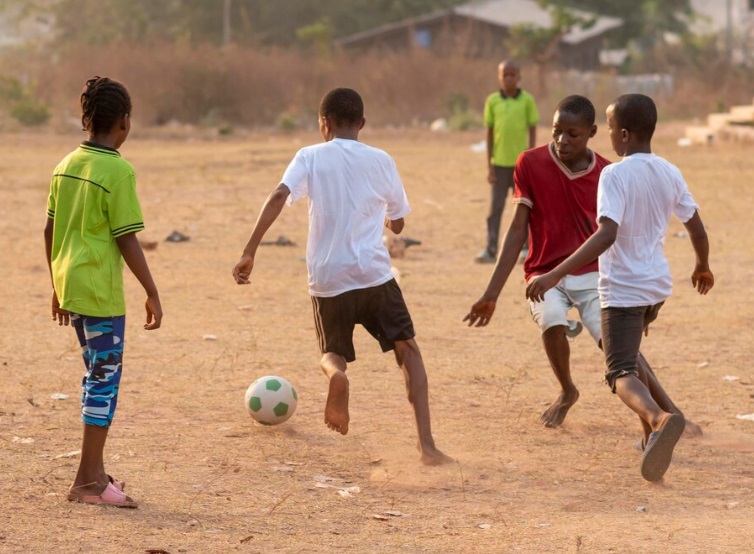
African children playing football outdoors. Image credit: Freepik.
Physical activity helps to improve your child's brain health, muscular fitness, heart and lung health, cardiometabolic health, healthy weight, long-term health, bone strength, and school performance.
Introducing your child to exercise wouldn't be a difficult task, as children love to move naturally. All you have to do is plan your child's exercise according to their interest. For instance, you might want to consider a dance class for a child who loves music or a swimming class for a child who goes close to water and plays with it often.
Outdoor activities such as walking, visiting a park, outdoor yoga, games, running, etc. will go a long way in incorporating physical activity in your child.
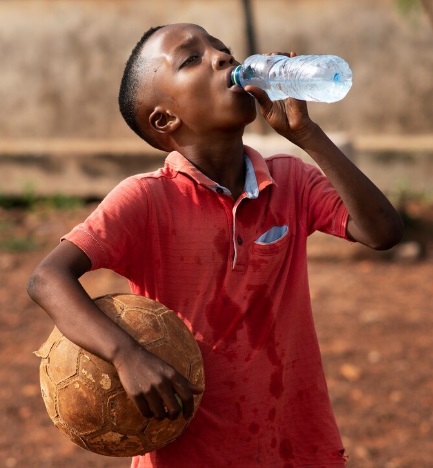
African boy drinking water from a bottle. Image credit: Freepik
Of all the drinks in the world, water is the best choice for hydration because it has zero calories and no added sugar
Water plays an important role in carrying nutrients to all cells in a child's body and oxygen to their brain. It flushes out toxins and waste, regulates body temperature, and acts as lubricant for their joints and muscles. The water needed in children is quite different from that of adults, as it varies according to your child's age.
Getting your child to drink water shouldn't be difficult. You can encourage them to take up this healthy habit by infusing their water with lemons, berries, cucumber, or mint. Make your child's water can or cup a colorful one or in their favorite cartoon or sports character.

African child sleeping. Image credit: Lekan Ridwan on Unsplash
Children need different sleep hours per day for body regeneration, great intellectual functioning, and adequate mental health and behavior, depending on their age.
It can be difficult for your child to concentrate at school or manage emotions when they don't get enough sleep. As parents, you want to do your best to help your child build healthy sleep habits.
How?
How long should your child sleep a day? The US National Sleep Foundation recommends the following sleep hours for children at different ages:
Personal hygiene is a journey that begins from the very first day your child is brought into the world. At this time their skin and immune system are the most delicate, which is why it is important to pay attention to hygiene so that your child is not only healthy but also looks and smells clean. Here are some simple hygiene routines you should teach your child:
(a) Personal grooming: Personal grooming is a reflection of self-care, which helps to boost your child's confidence. A child generally cannot trim their hair independently and most are unable to trim their nails independently below age 5 without risk, it is your duty to either do this for them or you supervise a trained service provider to trim their hair and nails. It is also your responsibility to assist them to dress well, appear neat at all times and use age appropriate deodorant (as may be affordable and culturally acceptable).
(b) Skin/hair care: Children do not need much skin or hair care products. A mild soap, moisturizer, sunscreen, shampoo, comb, or hairbrush are basic essentials needed for their skin and hair.
Children are bound to play roughly, so they should bathe 2 to 3 times a day and at least wash their hair 2 times a week.
(c) Daily teeth brushing: Instill in your child to brush twice a day, in the morning and before bedtime. Encourage them to do this in front of a mirror; with this, they will find it fun and also see how the tooth brushing process works. You may also want to choose toothbrushes in their favorite color or characters to motivate them. If your child is under 7 years old, you should guide them through the process.
(d) Hand washing: Encourage your child to wash their hands with soap and water after blowing their nose, sneezing, or coughing, after each activity, especially that which involves touching surfaces, before eating, and after using the toilet.
(e) Proper way to cough/sneeze: It is very easy to transmit communicable disease among children due to their not fully developed immune system. Encourage your child to cover their mouth while sneezing/coughing and when someone else is coughing/sneezing around them.
Also tell them to wash their hands after carrying out the actions above.
(f) Use of a face mask as needed: To prevent the transmission of the cold to other children or their siblings. Your child should use a face mask. A face mask is also needed whenever they are engaging in cleaning, especially in dusty areas.
Physical and mental health in children are the foundation to a healthier life and overall wellbeing. They determine how children function at home, in school, among their peers, and in the community. They influence their developmental and emotional milestones and how they are able to cope with problems. A child's mental health can be influenced by their family, community relationships, access to opportunities, and environmental circumstances.
Childhood and adolescence are critical stages of life for physical and mental health; this is a time of rapid growth and brain development.
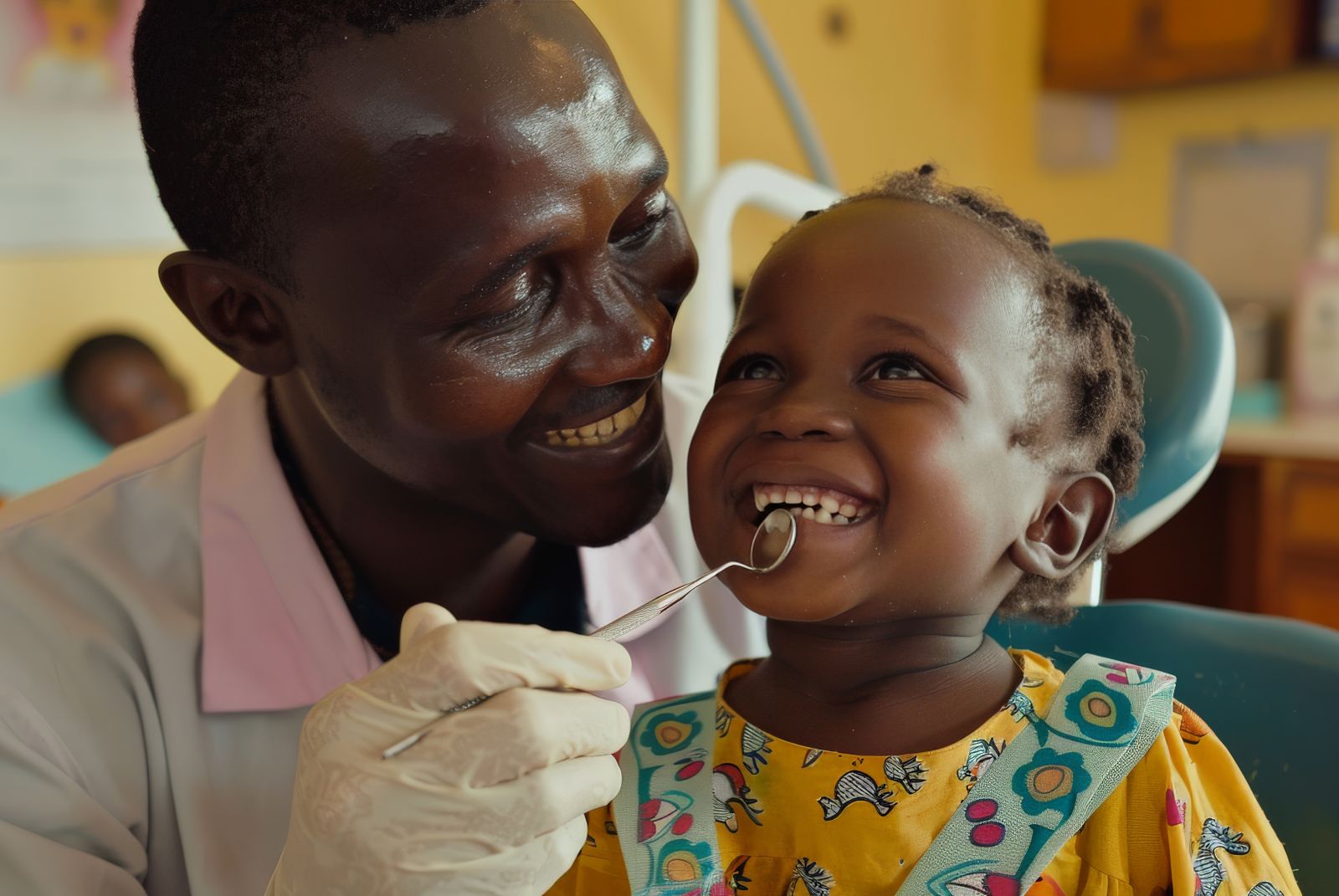
An African father and daughter at dental checkup.Image credit: bugphai on Freepik
Here are ways to look after your child's physical and mental health.
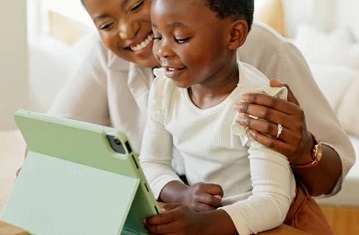
Schedule screen time for kids. Image credit Depositphoto
Screen time includes activities done in front of a screen like watching TV, using a computer, playing video games, surfing the internet, or using social media. It is important to regulate your child's screen time so as to prevent incidents attributed to too much screen time, such as obesity, inadequate sleep schedules, behavior problems, attention problems, and less time learning.
To regulate screen time;

A black woman and child walking in an open field. Image credit: Freepik
Culture is the way of life, and the environment plays an important role in a child's development. Culture and environment contribute to the makeup of an individual; therefore, environmental education must be learned from childhood.
Your child should be able to live in harmony with nature and also grow to make conscious decisions that also consider future generations. Also, educating your child about their culture and environment will be helpful toward achieving long-term environmental sustainability.
Programs on culture and environment should be encouraged in kids at home and in school activities to widely achieve the aim of culture and environmental awareness.
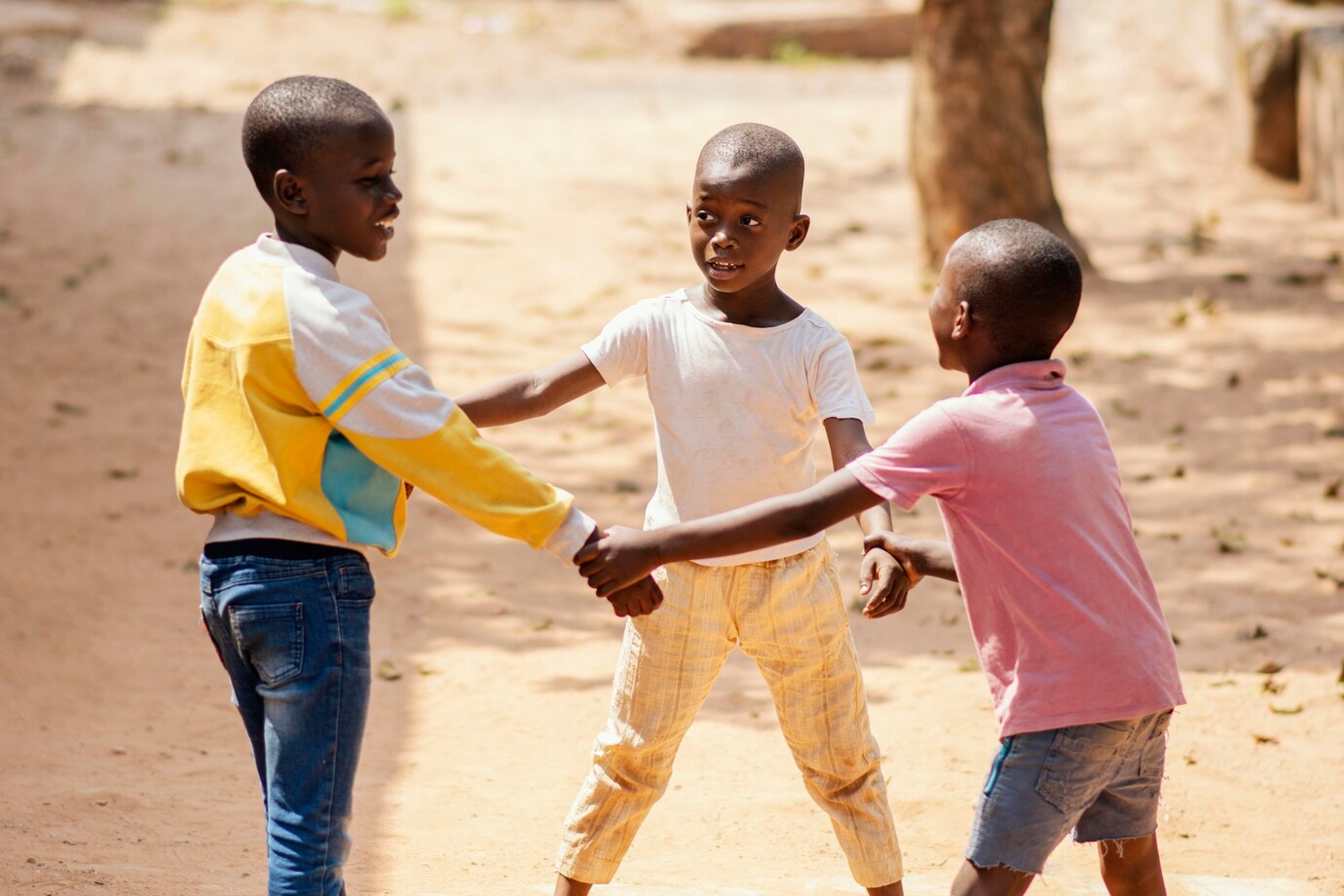
African children bonding in playful frienship outdoors. Image credit: Freepik
Social skills are not inborn. As children grow, they need to be taught social skills so that they can be able to navigate through every facet of life. It is your job as a parent to sharpen your child's social skills and help them become well-adjusted individuals.
Here are a few ways to develop social skills in your child.
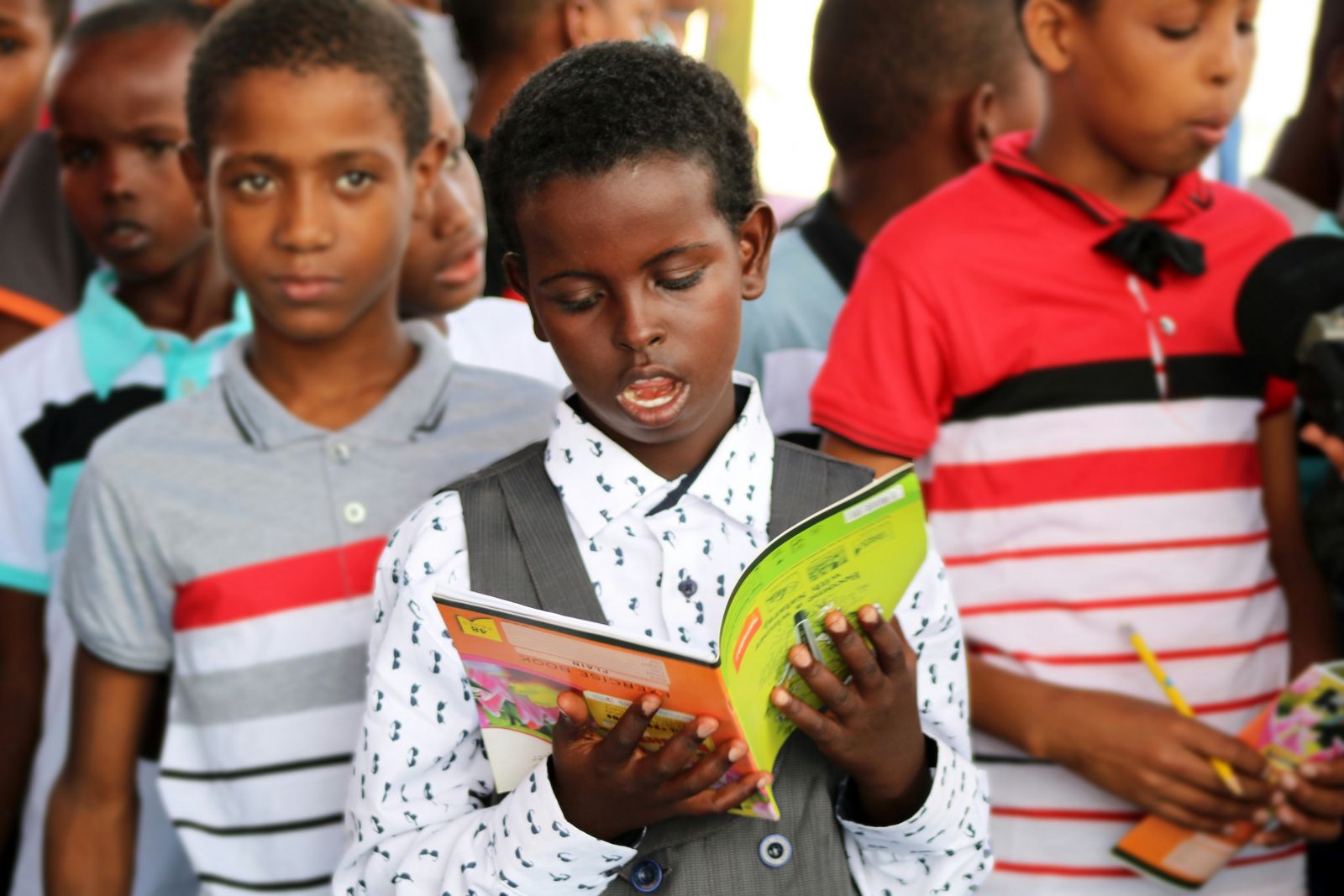
An African child reading a book in school with others in attention.
An early exposure of children to reading helps to develop their cognitive and language skills. It enhances their emotional intelligence, imagination and vocabulary which in turn contributes to a great academic success. To foster your child’s interest in reading, you can read them a story or a book before bedtime. Reading using this technique also helps to build parent-child bonding.
In conclusion, fostering healthy habits among children in Africa is essential for promoting overall well-being and development. Emphasizing nutrition, physical activity, hygiene, and mental health can significantly impact their growth and future potential. Initiatives that integrate community involvement, education, and access to resources are crucial for cultivating these habits. By addressing challenges such as food insecurity, lack of clean water, and inadequate healthcare, we can create a supportive environment that empowers children to lead healthy lives. Ultimately, investing in the health of African children not only benefits individuals but also contributes to the broader development and prosperity of communities and nations.
2. Calm.com. 13 healthy habits to start daily for a healthier lifestyle. [Internet n.d ]. Cited November 1, 2024. Available from here.
3. American Psychological Association. Diet and exercise for kids: Tips for acting boldly to create change. [Internet]. Last reviewed, September 28, 2023. Cited November 2, 2024. Available from here.
4. World Health Organization. Healthy diet. [Internet] April 29, 2020. Cited November 2, 2024. Available from here
5. Health direct. Healthy eating for children. [Internet]. Last reviewed, May 2024. Cited November 2, 2024. Available from here.
6. CDC. Healthy benefits of physical activity for children. [Internet]. April 3 2024. Cited November 2, 2024. Available from here.
7. Rethy J. Choose water for healthy hydration. Healthychildren.org. American Academy of Pediatrics. [Internet]. Last reviewed, July 26, 2024. Cited November 3, 2024. Available from here.
8. Sherwin E. How much water does my child need? Rise and shine. Children National. [Internet]. August 9, 2023. Cited November 3, 2024. Available from here.
9. Children Hospital Colorado. A parent's guide to sleep for kids: Healthy habits, benefits, screen time and more. [Internet]. May 11, 2020. Cited November 4, 2024. Available from here.
10. National Sleep Foundation. How much sleep do you really need? [Internet]. October 1 2020, 2022. Cited November 5, 2024. Available from here.
11. Aveeno. Encouraging good personal hygiene. [Internet n.d]. Cited November 5, 2024. Available from here.
12. CDC. About children's mental health. [Internet]. August 20, 2024. Cited November 5, 2024. Available from here.
13. NIH. National Library of Medicine. Screen time and children. Medlineplus. [Internet]. Last review, April 25, 2023. Cited November 5, 2024. Available from here.
14. Carepointe Academy. How can I help my child with social skills? [Internet]. May 11, 2022. Cited November 5, 2024. Available from here.
15. All for kids. The importance of reading to your children. [Internet]. May 11, 2023. Cited November 25, 2024. Available from here.
Published: November 26, 2024
© 2024. Datelinehealth Africa Inc. All rights reserved.
Permission is given to copy, use and share content for non-commercial purposes without alteration or modification and subject to source attribution.
DATELINEHEALTH AFRICA INC., is a digital publisher for informational and educational purposes and does not offer personal medical care and advice. If you have a medical problem needing routine or emergency attention, call your doctor or local emergency services immediately, or visit the nearest emergency room or the nearest hospital. You should consult your professional healthcare provider before starting any nutrition, diet, exercise, fitness, medical or wellness program mentioned or referenced in the DatelinehealthAfrica website. Click here for more disclaimer notice.